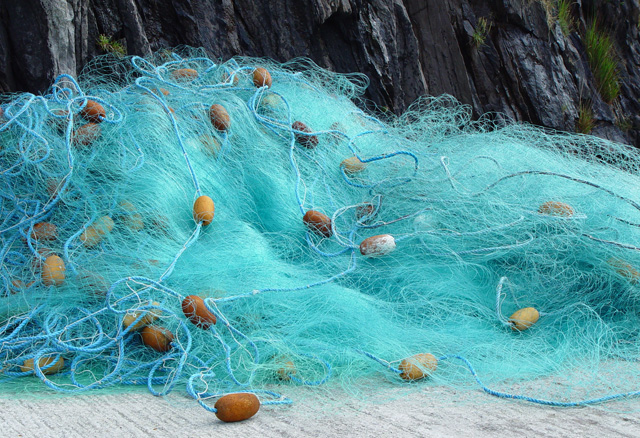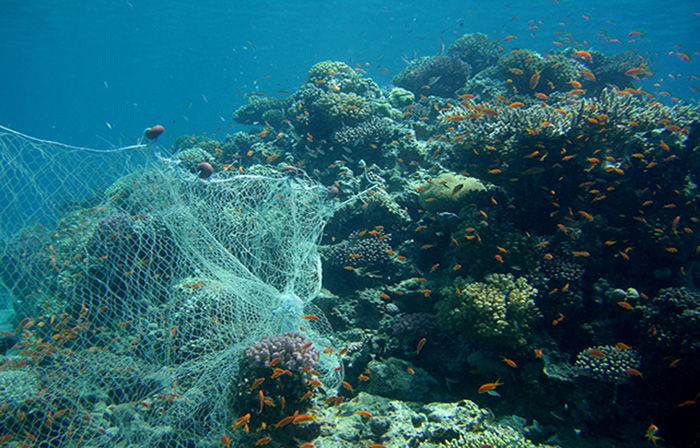
Fishing nets continue to catch sea life even after they’ve been lost or abandoned. This is called ‘ghost fishing’.
Grade-schoolers are taught to pick up Styrofoam from beaches, to tear up plastic can-holders, and to recycle garbage rather than toss it in the ocean—all so that sea creatures do not become entangled and marine ecosystems remain free of debris.
Yet as we grow older, it seems we quickly forget these lessons.
This is clear with the problem of ‘ghost gear,’ the result of fishing vessels abandoning or losing their fishing nets, lines, and other gear in the ocean–which then cause major problems for marine life. The FAO estimates that one-tenth of all marine litter is lost or discarded fishing gear—equaling 640,000 tonnes annually.
In response to the growing problem, the FAO has organized an Expert Consultation on the Marking of Fishing Gear from April 4-7, in Rome, to draft guidelines and search for solutions. After the consultation, the draft guidelines will then be reviewed by the FAO Committee on Fisheries for further consideration.
“Abandoned gear is one of the more problematic components of marine litter, since it remains in the oceans and often continues carrying out the capture process, entangling fish in its nets. This process is commonly referred to as ‘ghost fishing,’” it says on the FAO website.
In late March, 2016, several sperm whales were found beached on the shores of northern Germany. After a necropsy was completed, researchers discovered that the stomachs of four of the whales contained large amounts of plastic waste. The items consisted of fishing nets, car parts, and other plastic material.
The debris may not have directly caused their stranding, as it is thought the whales were possibly chasing squid into shallow waters. Thousands of squid beaks were also found in their stomachs. Yet the discovery is nevertheless alarming.
One possible solution to prevent the abandonment of fishing gear is to mark it with electronic and acoustic tags, which would presumably make it easier to recover, and easier to hold those who discarded it more accountable. However, regulations are currently very weak.
According to the FAO website, “there are few requirements by governments for ownership marking on gear, and no international regulations, guidelines, or common practices exist for the marking of fishing gear deployed outside of national jurisdictions.”
Ms. Amy Poon, a UBC student supervised by Dr. Pauly, presented in 2005 a masters’ thesis titled “Haunted Waters: An estimate of ghost fishing of crabs and lobsters by trap”. Through a rigorous procedure involving multiple case studies, she estimated that globally, about 4 % of crab and lobster catches are wasted, as they are due to lost and derelict traps. Some of her estimates were as high as 20%.
To prevent these losses, she writes that escape gaps can be built into the nettings of traps, allowing non-targeted animals to find their way out in the event a trap is abandoned. In the United States, federal law mandates both escape vents and degradable panels that allow lobsters and other animals to escape ghost fishing traps. Also, in areas where there is high boating traffic, trap-free lanes can be designated so as to avoid entanglement.
While some countries are following these examples, progress is slow.
Some people are finding solutions through other means. In 2009, a group of divers created the Ghost Fishing Foundation, which brings scuba divers together to find and retrieve abandoned fishing gear. They started in the Dutch North Sea, recovering nets from the ocean floor, and some from ship wreckages. Sometimes they use large cranes to salvage especially large chunks of netting. They now have projects in other countries, like Belgium, Croatia, Malta and the United States.
Despite their efforts, the problem will continue to persist until international guidelines are created. Countries and industry need a framework to follow.
Back at the meeting in Rome, Mitchel Lay from the Caribbean Network Fisherfolk Organization urged that if guidelines are created to prevent abandoned ghost gear, it would be essential for there to be corresponding outreach and communication to the fisheries industry, for implementation to be effective.
And ultimately, any guidelines and regulations will need to be rigorously enforced and monitored, something that is known to pose substantial challenges in most fisheries.


